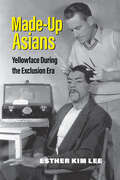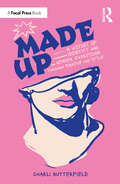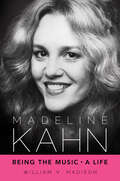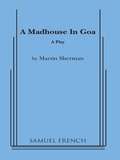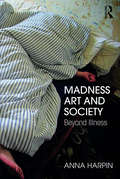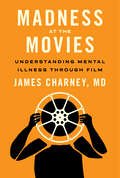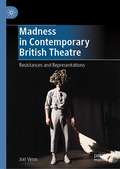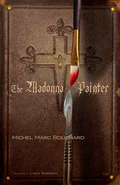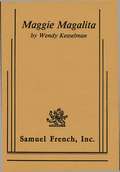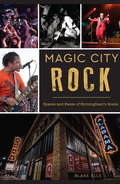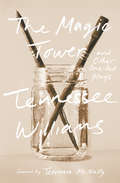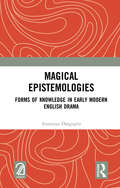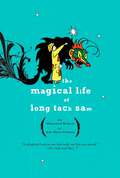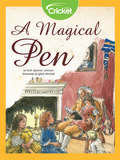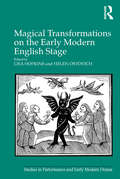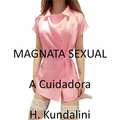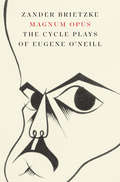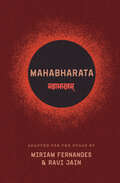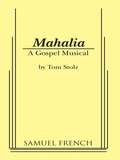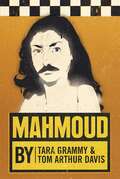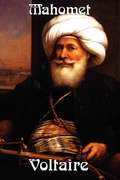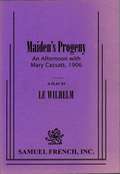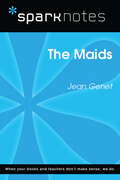- Table View
- List View
Made-Up Asians: Yellowface During the Exclusion Era
by Esther Kim LeeMade-Up Asians traces the history of yellowface, the theatrical convention of non-Asian actors putting on makeup and costume to look East Asian. Using specific case studies from European and U.S. theater, race science, and early film, Esther Kim Lee traces the development of yellowface in the U.S. context during the Exclusion Era (1862–1940), when Asians faced legal and cultural exclusion from immigration and citizenship. These caricatured, distorted, and misrepresented versions of Asians took the place of excluded Asians on theatrical stages and cinema screens. The book examines a wide-ranging set of primary sources, including makeup guidebooks, play catalogs, advertisements, biographies, and backstage anecdotes, providing new ways of understanding and categorizing yellowface as theatrical practice and historical subject. Made-Up Asians also shows how lingering effects of Asian exclusionary laws can still be seen in yellowface performances, casting practices, and anti-Asian violence into the 21st century.
Made Up: A History of Identity and Gender Expression Through Makeup and Style
by Charli ButterfieldThis book explores historical and modern uses of makeup for self-expression, with a focus on gender.The book begins by exploring the historical influences in the origins and development of makeup across genders, providing a whistle-stop tour of gendered adornment through time. The chapters that follow explore more specific topics that provide context for a range of influences on self-expression: Sex, gender and identity, including introductory gender theory and terminology relevant to the topic. Restrictions and resistance faced by the queer community regarding expression, with a historical look at pioneers of the movement. Gendered cosmetic advertisements through time. Subcultures and coded expression. Beauty and identity in the digital age. The impact of global ideals on the cosmetics market, with a focus on South Korea, exploring historical and modern influences and trends. The book can be explored in a sequential or non-sequential order, as each chapter provides a standalone approach to a topic and concludes with questions to encourage further contemplation and research.This book is written for anyone interested in the history of makeup as a vehicle for self-expression, and how gender comes into play; students and teachers of Theatrical makeup and Fashion courses, makeup artists, makeup enthusiasts, and those curious to discover what Ancient Egyptians and emos may have in common (spoiler: it’s not snakebites).
Madeline Kahn: Being the Music, A Life (Hollywood Legends Series)
by William V. MadisonBest known for her Oscar-nominated roles in the smash hits Paper Moon and Blazing Saddles, Madeline Kahn (1942–1999) was one of the most popular comedians of her time—and one of the least understood. In private, she was as reserved and refined as her characters were bold and bawdy. Almost a Method actor in her approach, she took her work seriously. When crew members and audiences laughed, she asked why—as if they were laughing at her—and all her life she remained unsure of her gifts. William V. Madison examines Kahn's film career, including not only her triumphs with Mel Brooks and Peter Bogdanovich, but also her overlooked performances in The Adventure of Sherlock Holmes' Smarter Brother and Judy Berlin, her final film. Her work in television—notably her sitcoms—also comes into focus. New York theater showered her with accolades, but also with remarkably bad luck, culminating in a disastrous outing in On the Twentieth Century that wrecked her reputation on Broadway. Only with her Tony-winning performance in The Sisters Rosensweig, fifteen years later, did Kahn regain her standing. Drawing on new interviews with family, friends, and such colleagues as Lily Tomlin, Carol Burnett, Gene Wilder, Harold Prince, and Eileen Brennan, as well as archival press and private writings, Madison uncovers Kahn's lonely childhood and her struggles as a single woman working to provide for her erratic mother. Above all, Madison reveals the paramount importance of music in Kahn's life. A talented singer, she entertained offers for operatic engagements long after she was an established Hollywood star, and she treated each script as a score. As Kahn told one friend, her ambition was “to be the music.”
A Madhouse in Goa
by Martin ShermanFull Length, Drama / 4 m, 2 f, with doubling / 2 verandas / Webs of personal, political, sexual, social and artistic deception unfold in the indigo nights and bright days of the Greek islands in this two part play by the author of Bent which starred Vanessa Redgrave in London and Judith Ivey in New York. In A Table for a King, which can also be produced as a one act, a writer helps blackmail an unpleasant and uncompromising woman who refuses to relinquish her table on the terrace of a Corfu hotel for the King of Greece. Part Two, Keeps Rainin' All the Time, moves to Santorini where a disparate group of expatriates, including a famous author, face nuclear rain, terrorism and the impending eruption of the volcano. The same cast may appear in both parts. / "The best new play of the London year."-Time
Madness, Art, and Society: Beyond Illness
by Anna HarpinHow is madness experienced, treated, and represented? How might art think around – and beyond – psychiatric definitions of illness and wellbeing? Madness, Art, and Society engages with artistic practices from theatre and live art to graphic fiction, charting a multiplicity of ways of thinking critically with, rather than about, non-normative psychological experience. It is organised into two parts: ‘Structures: psychiatrists, institutions, treatments’, illuminates the environments, figures and primary models of psychiatric care, reconsidering their history and contemporary manifestations through case studies including David Edgar’s Mary Barnes and Milos Forman’s One Flew Over the Cuckoo’s Nest. ‘Experiences: realities, bodies, moods’, promblematises diagnostic categories and proposes more radically open models of thinking in relation to experiences of madness, touching upon works such as Richard Kelly’s Donnie Darko and Duncan Macmillan’s People, Places, and Things. Reading its case studies as a counter-discourse to orthodox psychiatry, Madness, Art, and Society seeks a more nuanced understanding of the plurality of madness in society, and in so doing, offers an outstanding resource for students and scholars alike.
Madness at the Movies: Understanding Mental Illness through Film
by James CharneyA unique exploration of how mental illness is portrayed in classic and contemporary films.The study of classic and contemporary films can provide a powerful avenue to understand the experience of mental illness. In Madness at the Movies, James Charney, MD, a practicing psychiatrist and long-time cinephile, examines films that delve deeply into characters' inner worlds, and he analyzes moments that help define their particular mental illness. Based on the highly popular course that Charney taught at Yale University and the American University of Rome, Madness at the Movies introduces readers to films that may be new to them and encourages them to view these films in an entirely new way. Through films such as Psycho, Taxi Driver, Through a Glass Darkly, Night of the Hunter, A Woman Under the Influence, Ordinary People, and As Good As It Gets, Charney covers an array of disorders, including psychosis, paranoia, psychopathy, depression, bipolar disorder, obsessive-compulsive disorder, and anxiety. He examines how these films work to convey the essence of each illness. He also looks at how each film reflects the understanding of mental illness at the time it was released as well as the culture that shaped that understanding.Charney explains how to observe the behaviors displayed by characters in the films, paying close attention to signs of mental illness. He demonstrates that learning to read a film can be as absorbing as watching one. By viewing these films through the lens of mental health, readers can hone their observational skills and learn to assess the accuracy of depictions of mental illness in popular media.
Madness in Contemporary British Theatre: Resistances and Representations
by Jon VennThis book considers the representation of madness in contemporary British theatre, examining the rich relationship between performance and mental health, and questioning how theatre can potentially challenge dominant understandings of mental health. Carefully, it suggests what it means to represent madness in theatre, and the avenues through which such representations can become radical, whereby theatre can act as a site of resistance. Engaging with the heterogeneity of madness, each chapter covers different attributes and logics, including: the constitution and institutional structures of the contemporary asylum; the cultural idioms behind hallucination; the means by which suicide is apprehended and approached; how testimony of the mad person is interpreted and encountered. As a study that interrogates a wide range of British theatre across the past 30 years, and includes a theoretical interrogation of the politics of madness, this is a crucial work for any student or researcher, across disciplines, considering the politics of madness and its relationship to performance.
The Madonna Painter
by Michel Marc Bouchard Linda GaboriauAt the end of the Great War, to protect his village from the Spanish flu epidemic, a priest commissions an Italian painter to decorate the local church with a fresco dedicated to the Virgin Mary. The painter is to choose, among four local women all named Mary, a model for his work. Superstition collides with desire, and lies are unmasked.
Maggie Magalita
by Wendy KesselmanFull length, drama / 3 f (1 teenager), 1m (teenager), various voices / Interior / A 14 year old Hispanic immigrant who lives with her working mother in a New York City studio apartment, Maggie is trying hard to blend into the American lifestyle and she's succeeding. But she's also forgetting the beauty and pride of her heritage. Now that she has an American boyfriend, she wants to have even less to do with her native culture. Grandmother comes from the old country and upsets Maggie's plans: she can't speak English, can't dress American, can't cook American. She just can't blend! When Maggie's American boyfriend comes over for what turns out to be a very non American dinner, Maggie begins to understand something very precious: herself. This winner of the Sharfman Competition at Kennedy Center is perfect for high school productions.
Magic City Rock: Spaces and Faces of Birmingham’s Scene
by Blake EllsBirmingham's rock music scene has thrived on camaraderie and collaboration for decades. With no competitiveness, it has maintained a punk rock ethos while also appealing to a mainstream audience, thanks to DIY clubs and alternative radio support. Once one of the country's most successful AAA radio stations, 107.7 The X and the A&R power of station head Scott Register provided the early radio success that helped break Train, Matchbox Twenty and John Mayer. The same scene produced Jim Bob & the Leisure Suits, the Primitons, the Sugar La Las and Verbena. From local legends like Hotel and Telluride to national sensation St. Paul and the Broken Bones, writer Blake Ells tells the story of the Magic City's indelible stamp on the history of modern rock.
The Magic Tower and Other One-Act Plays
by Terrence Mcnally Tennessee Williams Thomas KeithA wonderful collection of never-before-collected one-acts: "The peak of my virtuosity was in the one- act plays. Some of which are like firecrackers in a rope" (Tennessee Williams). Here are portraits of American life during the Great Depression and after, populated by a hopelessly hopeful chorus girl, a munitions manufacturer ensnared in a love triangle, a rural family that deals "justice" on its children, an overconfident mob dandy, a poor couple who quarrel to vanquish despair, a young "spinster" enthralled by the impulse of rebellion, and, in "The Magic Tower," a passionate artist and his wife whose youth and optimism are not enough to protect their "dream marriage." This new volume gathers some of Williams's most exuberant early work and includes one-acts that he would later expand to powerful full-length dramas: "The Pretty Trap," a cheerful take on The Glass Menagerie, and "Interior: Panic," a stunning precursor to A Streetcar Named Desire. The plays include: * At Liberty * The Magic Tower * Me, Vashya * Curtains for the Gentleman * In Our Profession * Every Twenty Minutes * Honor the Living * The Case of the Crushed Petunias * Moony's Kid Don't Cry * The Dark Room * The Pretty Trap * Interior: Panic * Kingdom of Earth * I Never Get Dressed Till After Dark on Sundays * Some Problems for The Moose Lodge
Magical Epistemologies: Forms of Knowledge in Early Modern English Drama
by Anannya DasguptaThis book began with a simple question: when readers such as us encounter the term magic or figures of magicians in early modern texts, dramatic or otherwise, how do we read them? In the twenty-first century we have recourse to an array of genres and vocabulary from magical realism to fantasy fiction that does not, however, work to read a historical figure like John Dee or a fictional one he inspired in Shakespeare's Prospero. Between longings to transcend human limitation and the actual work of producing, translating, and organizing knowledge, figures such as Dee invite us to re-examine our ways of reading magic only as metaphor. If not metaphor then what else? As we parse the term magic, it reveals a rich context of use that connects various aspects of social, cultural, religious, economic, legal and medical lives of the early moderns. Magic makes its presence felt not only as a forms of knowledge but in methods of knowing in the Renaissance. The arc of dramatists and texts that this book draws between Doctor Faustus, The Tempest, The Alchemist and Comus: A Masque at Ludlow Castle offers a sustained examination of the epistemologies of magic in the context of early modern knowledge formation. Please note: Taylor & Francis does not sell or distribute the Hardback in India, Pakistan, Nepal, Bhutan, Bangladesh and Sri Lanka.
Magical Imaginations
by Genevieve GuentherIn the English Renaissance, poetry was imagined to inspire moral behaviour in its readers, but the efficacy of poetry was also linked to 'conjuration,' the theologically dangerous practice of invoking spirits with words. Magical Imaginations explores how major writers of the period ? including Spenser, Marlowe, and Shakespeare ? negotiated this troubling link between poetry and magic in their attempts to transform readers and audiences with the power of art. Through analyses of texts ranging from sermons and theological treatises to medical tracts and legal documents, Genevieve Guenther sheds new light on magic as a cultural practice in early modern England. She demonstrates that magic was a highly pragmatic, even cynical endeavor infiltrating unexpected spheres ? including Elizabethan taxation policy and Jacobean political philosophy. With this new understanding of early modern magic, and a fresh context for compelling readings of classic literary works, Magical Imaginations reveals the central importance of magic to English literary history.
The Magical Life of Long Tack Sam
by Ann Marie FlemingA full-color graphic memoir inspired by the award-winning documentary-and the life and mystery of China's greatest magician. Who was Long Tack Sam? He was born in 1885. He ran away from Shangdung Province to join the circus. He was an acrobat. A magician. A comic. An impresario. A restaurateur. A theater owner. A world traveler. An East-West ambassador. A mentor to Orson Welles. He was considered the greatest act in the history of vaudeville. In this gorgeous graphic memoir, his great-granddaughter, the artist and filmmaker Ann Marie Fleming, resurrects his fascinating life for the rest of the world. It's an exhilarating testament to a forgotten man. And every picture is true.Watch a QuickTime trailer for this book.
A Magical Pen
by Ruth Spencer JohnsonDid you know that Congress signed the Declaration of Independence on the Fourth of July? In this short play, learn more about the Declaration as Thomas Jefferson himself tells his grandchildren the story of its creation.
Magical Transformations on the Early Modern English Stage (Studies in Performance and Early Modern Drama)
by Lisa Hopkins Helen OstovichMagical Transformations on the Early Modern Stage furthers the debate about the cultural work performed by representations of magic on the early modern English stage. It considers the ways in which performances of magic reflect and feed into a sense of national identity, both in the form of magic contests and in its recurrent linkage to national defence; the extent to which magic can trope other concerns, and what these might be; and how magic is staged and what the representational strategies and techniques might mean. The essays range widely over both canonical plays-Macbeth, The Tempest, The Winter’s Tale, The Merry Wives of Windsor, Doctor Faustus, Bartholomew Fair-and notably less canonical ones such as The Birth of Merlin, Fedele and Fortunio, The Merry Devil of Edmonton, The Devil is an Ass, The Late Lancashire Witches and The Witch of Edmonton, putting the two groups into dialogue with each other and also exploring ways in which they can be profitably related to contemporary cases or accusations of witchcraft. Attending to the representational strategies and self-conscious intertextuality of the plays as well as to their treatment of their subject matter, the essays reveal the plays they discuss as actively intervening in contemporary debates about witchcraft and magic in ways which themselves effect transformation rather than simply discussing it. At the heart of all the essays lies an interest in the transformative power of magic, but collectively they show that the idea of transformation applies not only to the objects or even to the subjects of magic, but that the plays themselves can be seen as working to bring about change in the ways that they challenge contemporary assumptions and stereotypes.
Magnata Sexual - A Cuidadora
by N. KundaliniMagnata Sexual A Cuidadora por N. Kundalini O Relatório da Cuidadora A cuidadora de Joanna conta sua experiência Após a morte de Joanna, seu livro foi publicado como ela desejava. Isso incentivou outros a divulgar suas histórias.
Magnum Opus: The Cycle Plays of Eugene O'Neill
by Zander BrietzkeAn original and provocative analysis of Eugene O'Neill's unfinished cycle play project From 1935 to 1939, Eugene O&’Neill worked on a series of plays that would trace the history of an American family through several generations. He completed just two of the proposed eleven plays—A Touch of the Poet and More Stately Mansions—which Zander Brietzke argues represent the core of the entire cycle. Combining archival research, literary analysis, and theatrical imagination, Magnum Opus invites an audience to see this unusual and exciting epic as a historical drama of our time.
Mahabharata
by Ravi Jain Miriam FernandesA contemporary dramatic take on a 4,000-year-old Sanskrit epic that is foundational to Indian culture. Why Not Theatre’s large-scale, once-in-a-generation retelling of Mahabharata brings together a cast of performers entirely from the South Asian diaspora, blending cultures and art forms in a spectacular production at the Shaw Festival and the Barbican Theatre in London. Over two parts (Karma and Dharma) and a communal meal (Khana), this translation and adaptation of Mahabharata spans generations and takes audiences into the hearts and minds of some of the most complex and enduring characters ever created. With warring families and devious revenge plots, Mahabharata tells the story of an ancient feud with philosophical and spiritual questions that are no less urgent today. In times of division, how do we find wholeness? Are we destined to repeat the mistakes of our ancestors? And how can we build a new world when we have nearly destroyed this one? Contains the full text of the play along with materials opening up the behind-the-scenes world of the production, including interviews with the creators, background and context about the source material, production photographs, a Mahabharata family tree, and glossary."Ravi Jain and Miriam Fernandes’s contemporary take on the Mahabharata is one of the most beautiful emotional journeys I have had the privilege to witness. It is inspiring, mind broadening, and speaks to all the senses. It even brings you back to the origins of theatre itself, when people would gather in the quarries around a bonfire to tell stories. With their tasteful use of technology, dance, and opera, the 4,000-year-old Sanskrit poem comes to life and feels more universal than ever. A captivating theatre experience, from the first flame to the last pixel." – Robert Lepage"In their stunning rendition of the great Indian epic Mahabharata, Ravi Jain and Miriam Fernandes brilliantly reverse the whole concept of what Bertolt Brecht famously advised theatre directors: to make the familiar, unfamiliar. Jain and Fernandes have turned the unfamiliar into the familiar. The 4,000-year-old saga most Indians grew up with is made accessible to a contemporary audience the world over. No mean feat. ‘The play, true to its source, crosses all boundaries of culture, class, and geography. Its timeless storytelling and evocative stage design is transformed into a saga for the world, with its fundamental emotions of human nature – power, hate, jealousy, greed, and lust. To be gob-smacked by this innovation would be an understatement. Immerse yourself in this take on the Mahabharata and travel with it in time into the past, present, and future of humanity." – Deepa Mehta
Mahadevbhai, 1892-1942, and Insomnia
by Ramu Ramanathan Ninaz KhodaijiMAHADEVBHAI (1892 - 1942) is a one-person play, which attempts to remind us of the times that were, and their devotion to truth. INSOMNIA consists of 4 Monologues by Ninaz Khodaiji.
Mahalia
by Tom StolzCharacters: 1 male, 2 female Simple set . Including music by various gospel composers as well as hymns and spirituals made famous by Mahalia Jackson, this is a joyous celebration of the life and music of the world's greatest gospel singer: a humble, deeply religious woman whose expressive, full throated voice carried her from a three room shanty in New Orleans to appearances before presidents and royalty. The joy and inspiration of her heartfelt songs provide a counterpoint to the urgent messages delivered by her friend, Martin Luther King. Standing at his side, Mahalia Jackson became the musical voice of the civil rights movement. Mahalia uses simple staging, only three actors, and piano and organ accompaniments to showcase 22 great gospel numbers in a moving, often humorous musical tribute. . "A first rate tour of the throbbing world of gospel music." Minneapolis Star Tribune. . "Superb in every way." Christian Chronicle. . "A rare joy, a balm for the spirit. This is not a night in the theatre but a soul cleansing experience. Don't miss it!" Sun Newspapers.
Mahmoud
by Tara Grammy Tom Arthur DavisMahmoud is an exuberant, if overwhelmingly passionate, Iranian engineer-cum-taxi driver who relishes the chance to regale his passengers with his love of Persian culture. Emanuelos, a fabulously gay Spanish perfume salesman, can talk a mile-a-minute about his boyfriend, Behnam. And then there's Tara, an awkwardly charming Iranian Canadian preteen who just wants to be "normal," whatever that means. When the three strangers find themselves crossing paths in the busy streets of Toronto, their experiences with racism, sexism, homophobia, homesickness, and everything in between become intertwined in unexpected ways.
Mahomet
by VoltaireThis powerful work was read by Voltaire to Frederick of Prussia in 1740, to the king's great delight. The play was withdrawn after the fourth representation, under pressure of Church authorities who professed to see in it a bloody satire against the Christian religion. Almost three hundred years later critics are still unclear if this play is a rebuke of Islam or of Christianity or, perhaps, both. Wilder Publications is a green publisher. All of our books are printed to order. This reduces waste and helps us keep prices low while greatly reducing our impact on the environment.
Maiden's Progeny
by Le WilhelmFull length, drama / 1m, 2f / Interior / Frederick M Winship (UPI) writes regarding MAIDEN's PROGENY, "It was high time that someone wrote a play about Mary Cassatt, the only American member of the original Impressionist coterie of artists. Le Wilhelm, has met the challenge with flying colors with MAIDEN's PROGENY." This intellectually entertaining drama takes the audience to Cassatt's chateau outside Paris on a spring afternoon when Wynford Johnston comes calling uninvited. What follows is living discussion, of two very head strong individuals, that ultimately results in an understanding and growth in both characters. Never falling into the category of a lecture, this play provides insight and understanding of the art and times at the dawning of the 20th century.
The Maids (SparkNotes Literature Guide Series)
by SparkNotesThe Maids (SparkNotes Literature Guide) by Jean Genet Making the reading experience fun! Created by Harvard students for students everywhere, SparkNotes is a new breed of study guide: smarter, better, faster. Geared to what today's students need to know, SparkNotes provides: *Chapter-by-chapter analysis *Explanations of key themes, motifs, and symbols *A review quiz and essay topicsLively and accessible, these guides are perfect for late-night studying and writing papers
